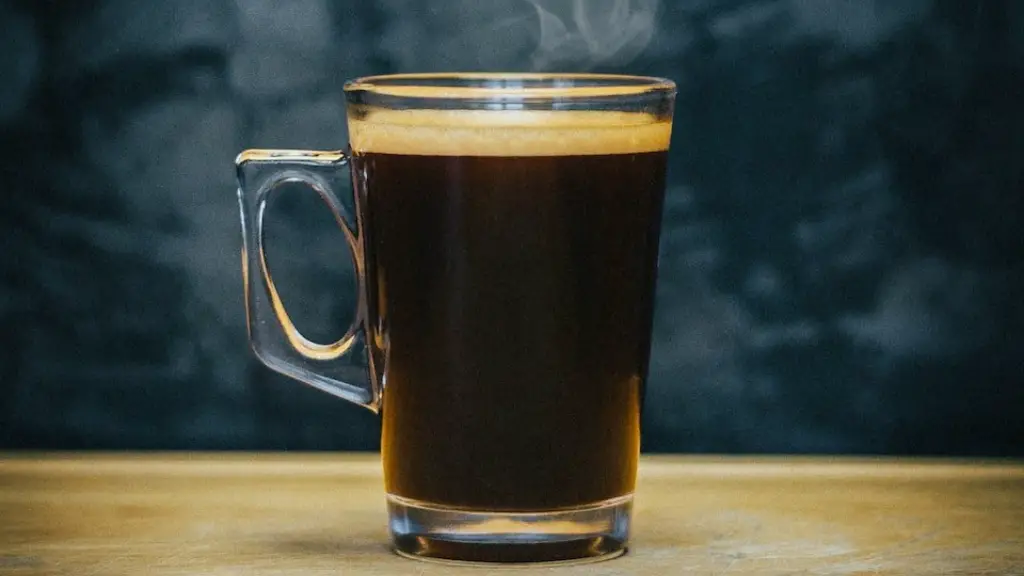Tonsillectomy is a surgical procedure performed to remove enlarged tonsils, enlarged adenoids, or both. It is generally used as a treatment for recurring acute tonsillitis or chronic tonsillitis. Commonly performed on adults and children, tonsillectomy is considered one of the most common surgical procedures in pediatric practice. While the surgery itself is relatively quick and straightforward, the recovery period can be quite uncomfortable. One of the most common questions for people who have undergone tonsillectomy is if they can drink coffee afterwards.
The answer to this question depends on the individual’s present condition and the specific kind of surgery that was performed. Generally, it is not recommended to drink coffee or any hot beverages soon after tonsillectomy as it can cause irritation and swelling of the surgical site. This is especially important in the first few days after surgery when the throat is still healing. Doing something like drinking hot coffee can make the recovery period more uncomfortable and may hinder the healing process.
It is, however, important to note that this depends on the kind of surgery done. For example, if laser tonsillectomy is performed, the healing process tends to be much faster, allowing patients to have hot beverages such as coffee sooner than a traditional tonsillectomy. This is because laser surgery causes less trauma to the tissue, allowing for faster healing.
When it comes to drinking coffee after tonsillectomy, it is best to speak to the patient’s doctor or surgeon to get a personalized answer. Depending on the person’s recovery, the doctor may suggest avoiding hot beverages or drinking colder coffee or tea. Additionally, if the patient is still experiencing pain and discomfort, the doctor may suggest avoiding coffee or any hot beverages entirely.
It is also important to keep in mind that hot beverages can increase the risk of bleeding after surgery. As the throat is still healing, the hot beverage can further irritate the throat and lead to bleeding. This is even more important for patients that are on blood thinners, as the risk of bleeding is much higher.
In general, it is best to avoid drinking coffee or any hot beverages soon after tonsillectomy as the throat is still healing and the hot beverages can cause further irritation. Before drinking coffee or any hot beverages, it is best to speak to the patient’s doctor to see if it is safe.
What To Eat After Tonsillectomy?
Once you’ve had a tonsillectomy, it can be difficult to know what to eat and when it is safe to eat solid foods again. Your doctor will likely recommend sticking to soft and cool foods while your throat is healing. Additionally, you should avoid foods that are too salty, spicy, or acidic, as they can irritate your throat and prolong the healing process. Some of the best foods to eat after tonsillectomy include ice cream, smoothies, yogurt, applesauce, oatmeal, mashed potatoes, and soups.
At the same time, it’s important to stay hydrated and drink plenty of fluids. Drinking plenty of water helps to keep your throat lubricated and prevent dehydration. You should also avoid carbonated and caffeinated beverages such as coffee, soda, and energy drinks. These beverages can irritate the throat or cause dehydration. Additionally, you should avoid alcohol and smoking, as these can also irritate your throat and hinder the healing process.
Before eating or drinking anything after a tonsillectomy, it is best to speak to your doctor. They will be able to give you personalized advice on what foods are safe and when it may be safe to start consuming solid foods again. Additionally, they can diagnose any issues that may arise during the recovery period.
How Long Does It Take to Recover From Tonsillectomy?
The recovery process after tonsillectomy can vary depending on the individual and the type of surgery performed. The recovery process typically starts a few days after the procedure and can last up to two weeks. In the first few days after the procedure, it is important to rest and drink plenty of fluids. Additionally, it is best to avoid drinking coffee or hot beverages and to eat only soft and cool foods. The doctor may also prescribe medication to help manage any pain or discomfort following the procedure.
After a couple of days, if the pain and discomfort have subsided, the patient should start to feel better. While the throat might still feel tender, the patient can slowly start to increase their intake of solid foods. However, it is important to remember that it can take up to three weeks for the throat to fully heal. During this time, it is best to continue to rest and avoid activities that can strain the throat. Additionally, it is best to avoid any strenuous physical activities such as swimming, running, or contact sports.
If the patient experiences persistent pain or discomfort after a couple of weeks, it is important to speak to a doctor. Additionally, if the patient experiences any unusual symptoms such as bleeding, fever, or swelling, they should speak to a doctor right away.
What Are The Benefits Of Tonsillectomy?
Tonsillectomy is a common surgical procedure that can provide a variety of benefits. While it is primarily performed as a treatment for recurring tonsillitis, it can also help to reduce snoring, relieve chronic ear infections, and improve overall breathing. Additionally, it can help to reduce the risk of further infections and can improve the patient’s quality of life.
Tonsillectomy has also been known to reduce sleeping problems such as daytime sleepiness and sleeping disorders. It can also help to decrease the severity of allergic reactions and reduce the number of infections in children. As the tonsils are removed, the body’s ability to fight off infections is improved, thus reducing the risk of further infections.
At the same time, tonsillectomy can help relieve the pain and discomfort associated with recurring tonsillitis. As the tonsils are removed, the risk of further pain and discomfort is reduced, thus improving the patient’s quality of life. Additionally, it can help to reduce the risk of certain types of cancers, such as throat and esophageal cancer.
What Are The Risks Of Tonsillectomy?
While tonsillectomy is generally safe and effective, there are some risks associated with the procedure. These risks can include pain, bleeding, infection, and inflammation. Additionally, some patients may experience difficulty swallowing or talking after the procedure. In some cases, the patient can also experience nausea, vomiting, or hoarseness.
It is also important to keep in mind that tonsillectomy is a surgical procedure, which means there is a risk of bleeding or an adverse reaction to the anesthesia. Additionally, there may be a risk of further infection due to the removal of the tonsils.
Before choosing to undergo tonsillectomy, it is best to speak to a doctor. The doctor can explain the procedure, the risks involved, and any other information that may be relevant. Additionally, the doctor can recommend any actions to reduce the risks involved and maximize the chances of a successful surgery.
Can Homeopathic Remedies Be Used To Treat Tonsillitis?
Homeopathic remedies are a popular alternative to conventional treatments and can be used to treat a variety of conditions, including tonsillitis. Homeopathy is based on the idea that the body can heal itself, and remedies are designed to promote healing by stimulating the body’s natural healing processes.
Some of the common homeopathic remedies used to treat tonsillitis include Mercurius solubilis, Arnica montana, and Kali bichromicum. These remedies can help to reduce the inflammation, reduce the pain and discomfort, and speed up the healing process. Additionally, they can help to prevent further infections and reduce the risk of complications.
Before using homeopathic remedies, it is important to speak to a qualified homeopath. The homeopath will be able to assess the patient’s condition and recommend the best remedies for the specific case. Additionally, they can provide any advice or information that may be relevant to the patient’s case.
Tonsillectomy can be a complex procedure that requires careful consideration and planning. However, when done correctly, it can provide a variety of benefits, including relief from the pain and discomfort caused by tonsillitis. While it is generally not recommended to drink coffee or any hot beverages soon after tonsillectomy, it is best to speak to the patient’s doctor so that they can give personalized advice. Additionally, it is important to keep in mind that it is best to eat soft and cool foods while the throat is healing and to stay hydrated. Furthermore, it is best to wait until the throat is fully healed before consuming any solid foods, and to avoid strenuous activities during the recovery period.





